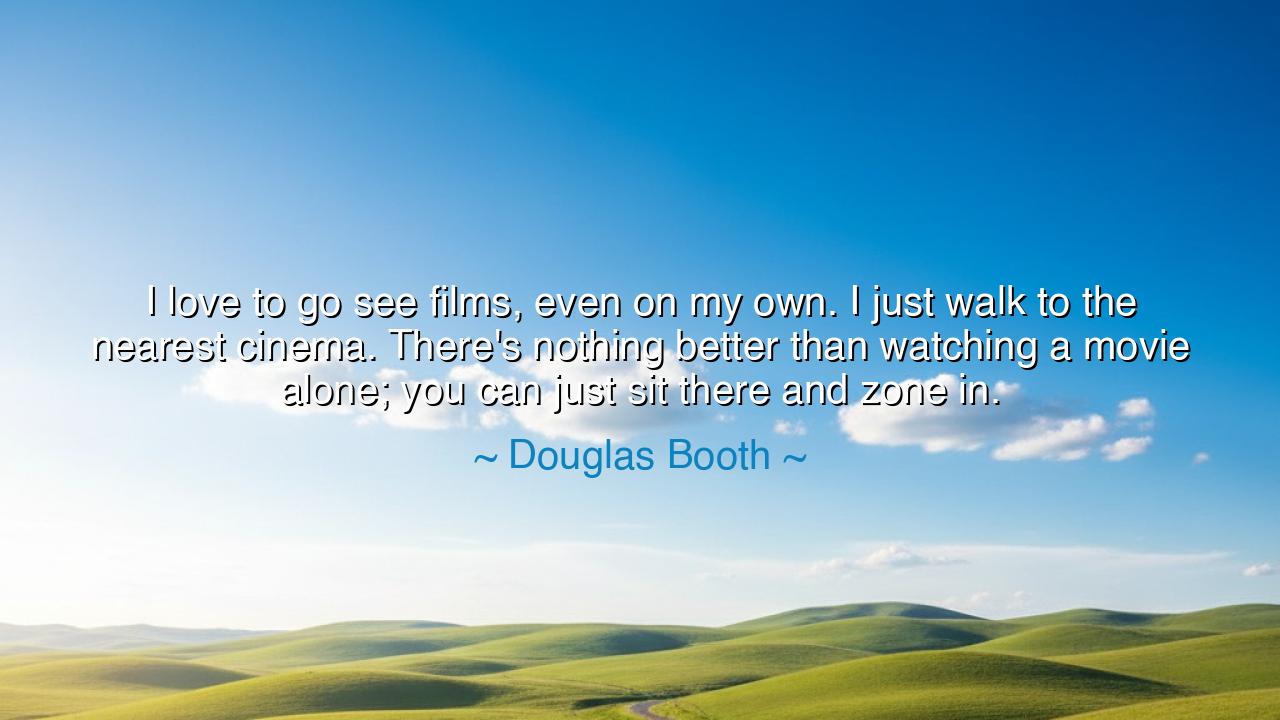
I love to go see films, even on my own. I just walk to the
I love to go see films, even on my own. I just walk to the nearest cinema. There's nothing better than watching a movie alone; you can just sit there and zone in.






"I love to go see films, even on my own. I just walk to the nearest cinema. There's nothing better than watching a movie alone; you can just sit there and zone in." These words from Douglas Booth speak to a timeless, deeply personal experience that transcends the simple act of watching a film. There is something profound about choosing solitude in the midst of the crowd, about finding peace and solace in the silence of one’s own mind, even while surrounded by the sensory experience of a movie. In a world that often demands connection, attention, and interaction, Booth reminds us of the extraordinary value of personal space, the freedom to engage with the world on our own terms, and the importance of zoning in—fully immersing ourselves in a moment that is purely ours.
In the ancient world, great philosophers and thinkers recognized the value of solitude. Socrates and Plato often spoke of the necessity of inner reflection—the ability to withdraw from the world around us and engage deeply with our own thoughts. For them, it was not only the pursuit of knowledge that was important, but the space to contemplate and understand that knowledge. Just as Booth finds solace in the cinema, these ancient figures found their solace in solitude, where they could contemplate the world without distraction, where they could reach deeper into their own minds and souls to unearth the truths of existence.
There is an intimate power in the experience of being alone with something that stirs the soul. To watch a film in solitude is to allow oneself the freedom to fully embrace the emotions, the visuals, the narrative without the interruption of conversation or external expectations. This experience mirrors the way the great artists of the past, like Michelangelo, worked alone in their studios, crafting masterpieces without the interference of others. Their genius came not from the collective noise, but from the solitude of their focused and uninterrupted creativity. In a similar vein, Booth’s joy in sitting alone at the cinema speaks to a deeper truth: that personal space and the freedom to immerse oneself in something purely personal can unlock new layers of emotion, understanding, and connection.
Take, for example, Albert Einstein, whose moments of solitude were essential to his breakthroughs in physics. It is said that some of his greatest insights came not in busy, crowded classrooms or laboratories, but in moments when he was alone with his thoughts, contemplating the mysteries of the universe. Like Booth in the cinema, Einstein would retreat from the noise of the world and find clarity in his own mind, allowing his imagination to roam freely. The lesson here is clear: solitude can be a fertile ground for insight and discovery. When we are alone, we are often free to engage with the world around us in a more profound and unfiltered way.
But there is also a more personal, emotional truth in Booth’s statement about the pleasure of watching a movie alone. In the solitude of the cinema, we are afforded a space to process and experience emotions without the expectations of others. It is a moment of escape, yes, but it is also a moment of connection—a deep, solitary connection to the story unfolding on screen, to the characters and their journeys, and to our own emotional responses. This is a form of therapy that transcends words—a space to reflect, to feel, and to let go. Booth’s joy in these solitary moments is a reminder that sometimes, the best way to engage with the world is to first engage with oneself.
The lesson to be learned from Booth’s words is one of embracing solitude as a tool for personal growth and understanding. In a world that often pressures us to be constantly engaged, to seek connection, and to share experiences, we must remember the power of personal time—the freedom to sit alone, to disconnect from the world, and to find meaning in our own thoughts and reflections. Solitude does not equal loneliness; rather, it is the space in which we discover the depth of our own being, a space where we can experience life with unfiltered clarity.
In practical terms, this means that we should not shy away from moments of solitude but seek them out when needed. Take time to engage in activities that allow you to be fully present with yourself—whether it’s watching a movie, reading a book, walking in nature, or simply sitting in silence. These moments of personal reflection are not just a luxury, but a necessity for our mental well-being and creativity. By embracing solitude, we create the space for deeper self-awareness and emotional connection, both with ourselves and the world around us.






AAdministratorAdministrator
Welcome, honored guests. Please leave a comment, we will respond soon